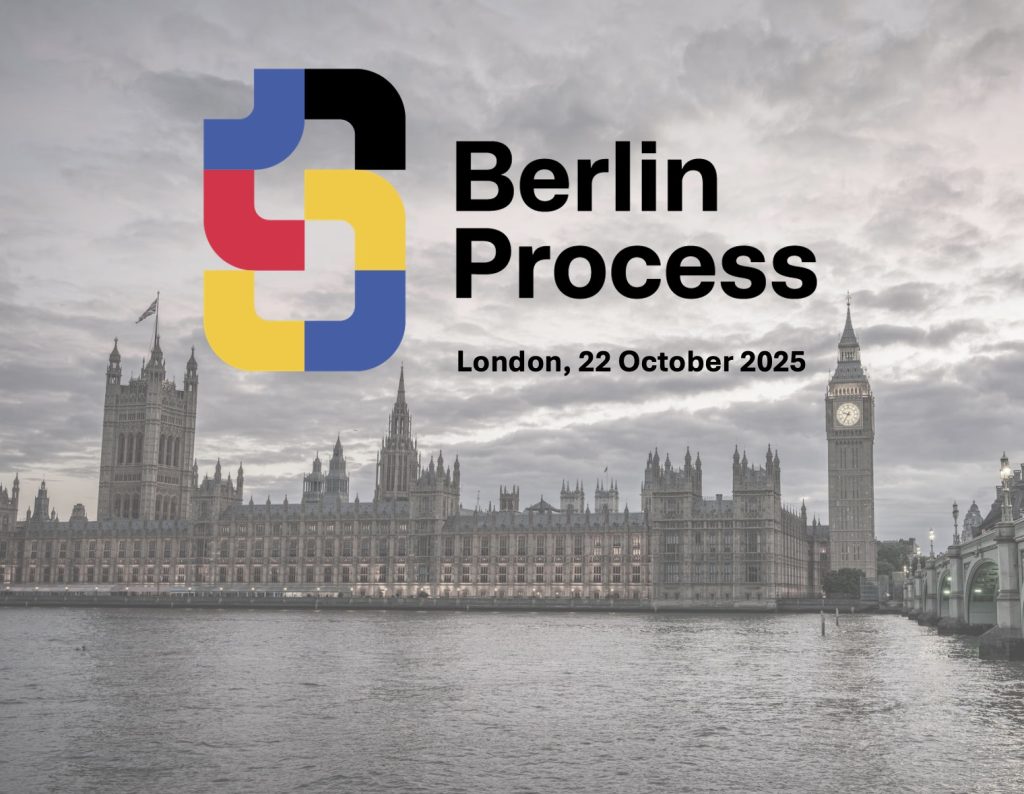London 2025 Berlin Process Conclusions and The Way Forward
Comments based on the Chair’s Conclusions, Western Balkans Summit on the Berlin Process – 22 October 2025.
The London Summit reaffirmed the Berlin Process as the central mechanism supporting the Western Balkans Six (WB6) on the path to EU integration, emphasising unity against geopolitical challenges. Decisions were reached across four key pillars: Migration, Economic Growth and Prosperity, Security, and Good Neighbourly Relations.
The Conclusions underline major opportunities, with the core benefit being accelerated convergence with the EU Single Market through full implementation of the Common Regional Market (CRM) and alignment with the European Green Deal. Policy recommendations focus on urgent legislative ratification, strategic investment activation, and reinforcing leadership in digital and green transitions.
Reaffirmation of European Cooperation
Held amid global geopolitical shifts, including Russia’s ongoing aggression against Ukraine, the Summit underscored the importance of European unity and cooperation. Leaders reaffirmed the Berlin Process as a driver of regional progress over the past eleven years and a key mechanism for supporting WB6 economies on their EU path.
The shared goal remains sustained, merit-based progress toward Euro-Atlantic integration, aligned with EU accession criteria and citizens’ democratic aspirations. Addressing issues from economic cooperation and connectivity to security, governance, and gender equality, the Summit showcased a comprehensive approach to preparing the WB6 for EU membership.
[1] Migration
Key steps included visa regime harmonisation with the EU, establishment of a Joint Migration Task Force (JMTF), and strengthened border management through cooperation with FRONTEX and the UK. The Western Balkans Border Directors’ Forum was made a permanent body, while the UK pledged £1 million (€1.2 million) to IOM’s AVRR programmes to support upstream interventions.
Illegal migration and organised immigration crime are now recognised as shared regional challenges requiring collective responses. The focus is shifting toward data-driven border resilience and harmonisation with EU legal frameworksto close loopholes exploited by criminal networks.
Strategic implications: JMTF participation offers stronger intelligence sharing, while visa alignment advances political convergence with the EU and protects the visa-free regime.
[2] Economic Growth and Prosperity
The EU committed over €37 billion and the UK up to £24 billion (€28 billion) for regional strategic investments. Progress on the CRM included recognition of industrial standards, AEO programmes, and movement toward labour mobility and digital trust services for paperless trade. Leaders agreed to expedite ratification of Protocol 7 on Dispute Settlement and endorsed the Green Agenda for the Western Balkans (GAWB) 2025–2030, including the Climate Adaptation Roadmap and a WB6 Adaptation Strategy by 2026.
Complementary measures introduced Green Bonds Standards, Sustainable Finance Taxonomy, and a Sustainable FDI Toolkit. Other outcomes included adoption of the Social Security Coordination Declaration, the Digital Identity Wallets Platform, and initiatives for Roma inclusion, women’s empowerment, and the creative economy supported by a £500,000 UK fund.
The economic agenda reflects a decisive shift from commitments to implementation and ratification, embedding sustainability in regional policies.
Strategic implications: Promoting G2G Partnership (2025). Leveraging the initiatives for digital integration. CRM and Social Security implementation will boost competitiveness and mobility. The Green Agenda provides a roadmap for modernising the energy sector and accessing climate finance.
[3] Security
The Summit advanced a comprehensive approach to regional security. The WB6 committed to enhancing cyber resiliencethrough the Cyber Capacity Centre in Podgorica and establishing a Cyber Diplomacy Network. Foreign Ministers also agreed to technical talks to counter Foreign Information Manipulation and Interference (FIMI).
To strengthen institutional integrity, participants reaffirmed commitment to the RAI Treaty on verifying asset declarations, combating illicit finance, and promoting transparency in ownership. Kosovo, North Macedonia, and Montenegro joined the Global Partnership on Gender-Based Online Harassment, supported by the STOP NCII initiative.
Strategic implications: Membership in the Cyber Diplomacy Network and the RAI Treaty enhances anti-corruption capacity and digital security, while participation in global digital rights initiatives boosts international recognition.
[4] Good Neighbourly Relations
Through the Hillsborough Castle Declaration, participants renewed their commitment to reconciliation. The UK announced support for partnerships between cultural institutions and grassroots organisations, alongside a Northern Ireland–WB6 working group on inter-community relations.
The WB6 also established a Women in Diplomacy Network, dedicating 15% of Western Balkans Fund resources to gender equality initiatives, and expanded support for youth mobility through RYCO’s Cultural Fund.
Strategic implications: The Northern Ireland–WB6 initiative offers expertise in managing multi-ethnic relations. Dedicated gender funding provides a new channel for social projects. Strengthened youth engagement supports regional reconciliation and inclusion.
Policy Recommendations and Way Forward
To fully capitalise on the London Summit outcomes and accelerate Euro-Atlantic integration, WB6 countries should prioritise:
• Economic Integration: Rapidly ratify and implement all CRM decisions.
• Investment & Green Transition: Fast-track strategic infrastructure and green energy projects under the G2G framework; lead in climate adaptation by finalising the WB6 Adaptation Strategy.
• Governance & Integrity: Fully implement the RAI Treaty to reinforce anti-corruption oversight.
• Security & Digital Governance: Leverage regional digital leadership and international partnerships.
• Social Cohesion & Youth: Develop circular mobility policies to support diaspora reintegration and reduce brain drain.
Next Steps for the Berlin Process
The next Berlin Process Leaders’ Summit will take place in Podgorica, Montenegro (2026). The intervening period should demonstrate measurable and verifiable progress, particularly in CRM legislative implementation, which remains the primary benchmark for success. Achieving these goals will solidify the region’s role as a proactive and reliable partner in the Berlin Process and accelerate its trajectory toward EU membership and sustainable prosperity.
- By Strategers

